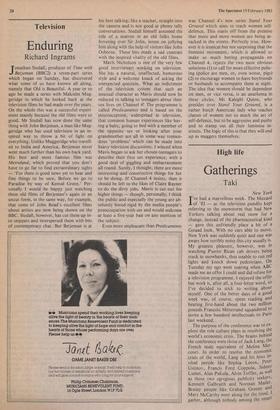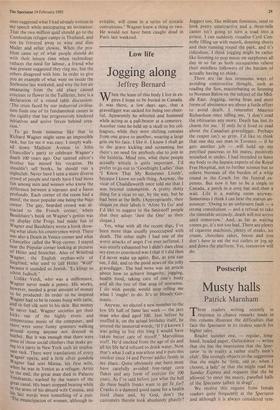High life
Gatherings
Taki
New York
Tye had a marvellous week. The blizzard of '83 — as the television pundits kept referring to the snowstorm that had New Yorkers talking about real snow for a change, instead of the pharmaceutical kind — gave this unfriendly place a bit of a Gstaad look. With no cars able to move, New York was suddenly quiet and one was aware how terribly noisy this city usually is. My greatest pleasure, however, was in watching Puerto Rican cab drivers being stuck in snowbanks, thus unable to run red lights and knock down pedestrians. On Tuesday my ego went soaring when ABC made me an offer I could and did refuse for a television programme. I enjoyed the offer but work is, after all, a four-letter word, so I've decided to stick to writing about myself. One of the better days of a good week was, of course, spent reading and hearing first-hand about the two million pounds Francois Mitterrand squandered to invite a few hundred intellectuals to Paris last weekend.
The purpose of the conference was to ex- plore the role culture plays in resolving the world's economic crisis. The brains behind the conference were those of Jack Lang, the French male equivalent of Melina Mer- couri. In order to resolve the economic crisis of the world, Lang and his boss In- vited people like Sophia Loren, Peter Ustinov, Francis Ford Coppola, Sidney Lumet, Alan Pakula, Alvin Toffler, as well as those two egregious publicity seekers, Kenneth Galbraith and Norman Mailer. Brainy people like Graham Greene and Mary McCarthy went along for the food, I gather, although nobody among the smart
ones suggested what I had already written in my speech while anticipating an invitation: That the two million quid should go to the Cambodian refugee camps in Thailand, and not be frittered away to wine and dine Mailer and other clowns. When the pro- blem came up of what people should do with their leisure time when technology reduces the need for labour, a friend who was present suggested they ring me, but the others disagreed with him. In order to give you an example of what went on inside the Sorbonne last weekend, and why the hot air emanating from the old place caused crocuses to flower in the Tuilleries, here is a declaration of a round table discussion: 'The crisis faced by our industrial civilisa- tion finds one of its fundamental causes in the rigidity that has progressively hindered initiatives and active forces behind crea- tion.'
To go from nonsense like that to Richard Wagner might seem an impossible task, but for me it was easy. I simply walk- ed down Madison Avenue to John Chancellor's party to celebrate Wagner's death 100 years ago. Our sainted editor's brother has missed his vocation. He shouldn't sell books, he should run a nightclub. Never have I seen a more diverse crowd of people and rarely have I had more fun among men and women who know the difference between a soprano and a basso profundo. Each corner of the room had a motif, the most popular one being the Nazi corner. The gay, bearded crowd was at- tracted to the French corner, where Baudelaire's book on Wagner's genius was on display (the Frogs had made fun of Wagner and Baudelaire wrote a book show- ing what idiots his countrymen were). There Was also a Death in Venice corner and what Chancellor called the Wop corner. I stayed near the Popular corner looking at pictures of Hitler and Streicher. Also of Winifred Wagner, the English orphan-wife of Siegfried, who used to call Hitler 'Wolf' because it sounded so Jewish. 'Es klingt so schOn Judisch.'
Unlike Verdi, who was a millionaire, Wagner never made a penny. His works, however, needed a great amount of money to be produced. In order to be inspired Wagner had to be in rooms hung with satin, and to feel silk next to his skin. But money he never had. Wagner societies get their kicks out of the highly erotic and tempestuous music of the composer, and there were some funny spinsters walking around eyeing anyone not dressed in leather. But it was enough that there were none of those social climbers that make go- ing to a party in New York such an unplea- sant task. There were translations of every Wagner opera, and a little silver gondola Wagner had sent Minna, his first wife, when he was in Venice as a refugee. Artist to the end, the great man died in Palazzo Vendramin, washed by the waters of the great canal. His heart stopped beating while in. the arms of his absurd wife Cosima, and h
last words were something of a pun: ne emancipation of women, although in- evitable, will come in a series of ecstatic convulsions.' Wagner knew a thing or two. He would not have been caught dead in Paris last weekend.







































 Previous page
Previous page